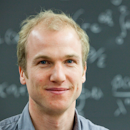Virus Evolution and the Predictability of Next Year’s Flu
- Speaker
-
 Richard NeherKavli Institute for Theoretical Physics, University of California, Santa Barbara
Richard NeherKavli Institute for Theoretical Physics, University of California, Santa Barbara
Presidential Lectures are free public colloquia centered on four main themes: Biology, Physics, Mathematics and Computer Science, and Neuroscience and Autism Science. These curated, high-level scientific talks feature leading scientists and mathematicians and are intended to foster discourse and drive discovery among the broader NYC-area research community. We invite those interested in the topic to join us for this weekly lecture series.
By clicking to watch this video, you agree to our privacy policy.
Our immune systems rapidly overcome many viral infections and protect us against repeated infections. However, we are unable to clear HIV infections and suffer repeatedly from influenza. These viruses evade immune recognition by rapidly changing parts of their proteins. New viral variants emerge continuously and compete against each other in complicated stochastic dynamics.
In this lecture, Richard Neher will present recent progress in our understanding of the evolutionary dynamics of organisms, such as HIV and the influenza virus. His team sequenced the whole genome of thousands of HIV viruses from many samples from the same HIV-infected individual and developed mathematical models to describe virus evolution. These models were used to infer fitness of circulating influenza viruses, which in turn allowed the team to predict properties of future influenza viruses. Since the seasonal influenza vaccine is only effective when the vaccine virus matches the circulating virus population, such predictions of future influenza viruses can improve the vaccine.
